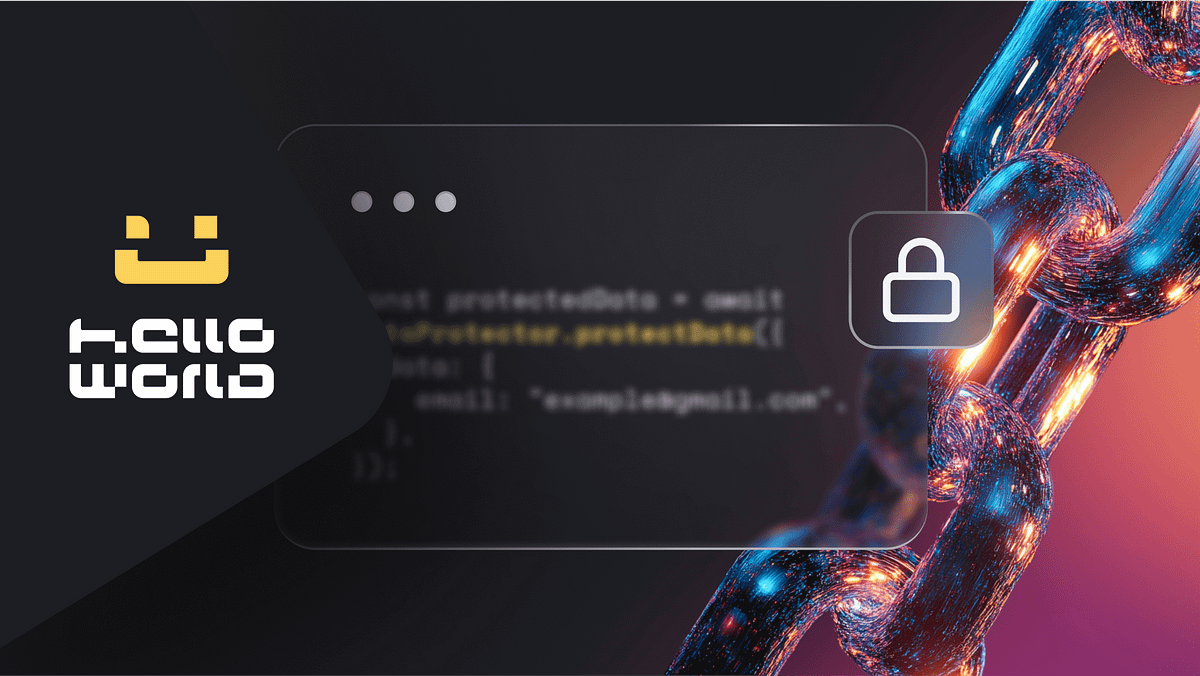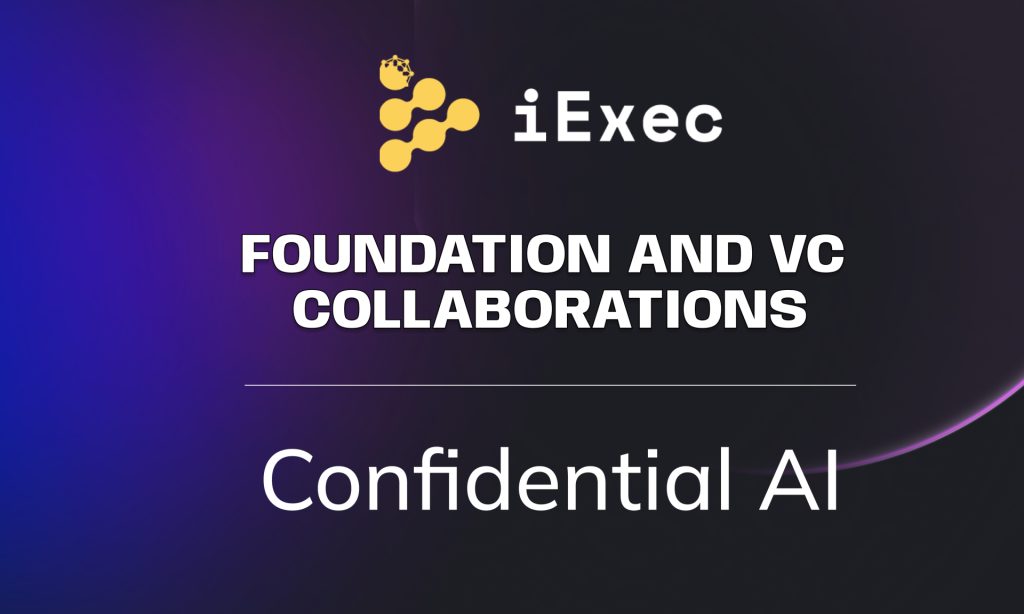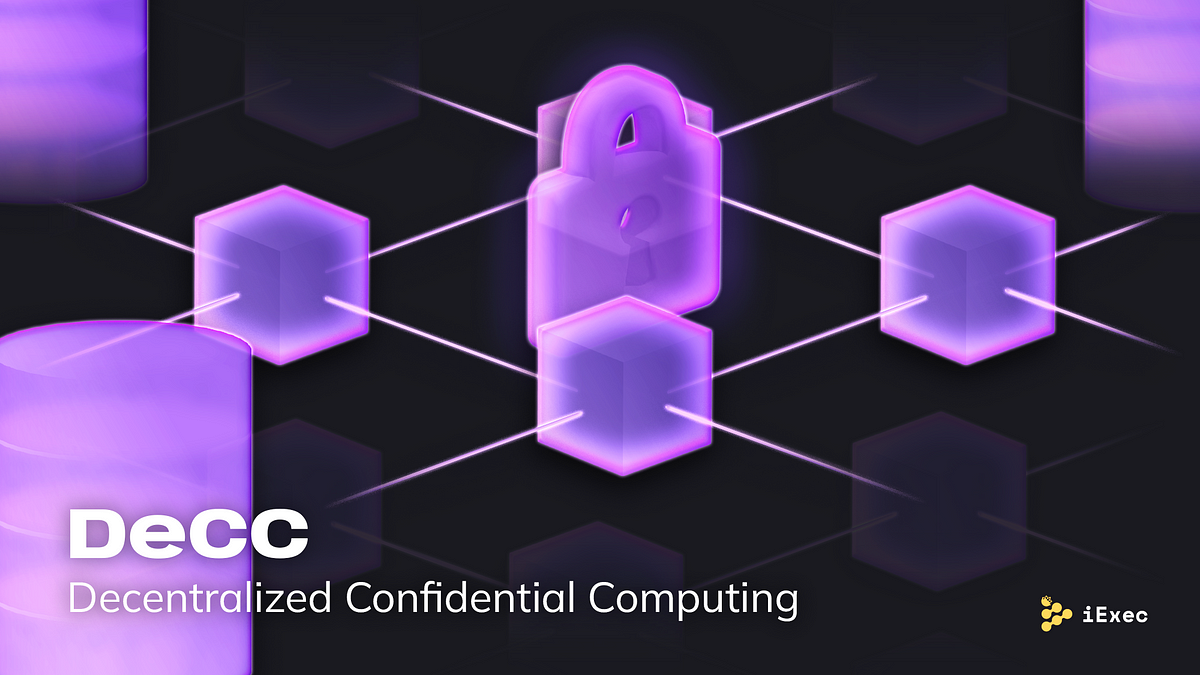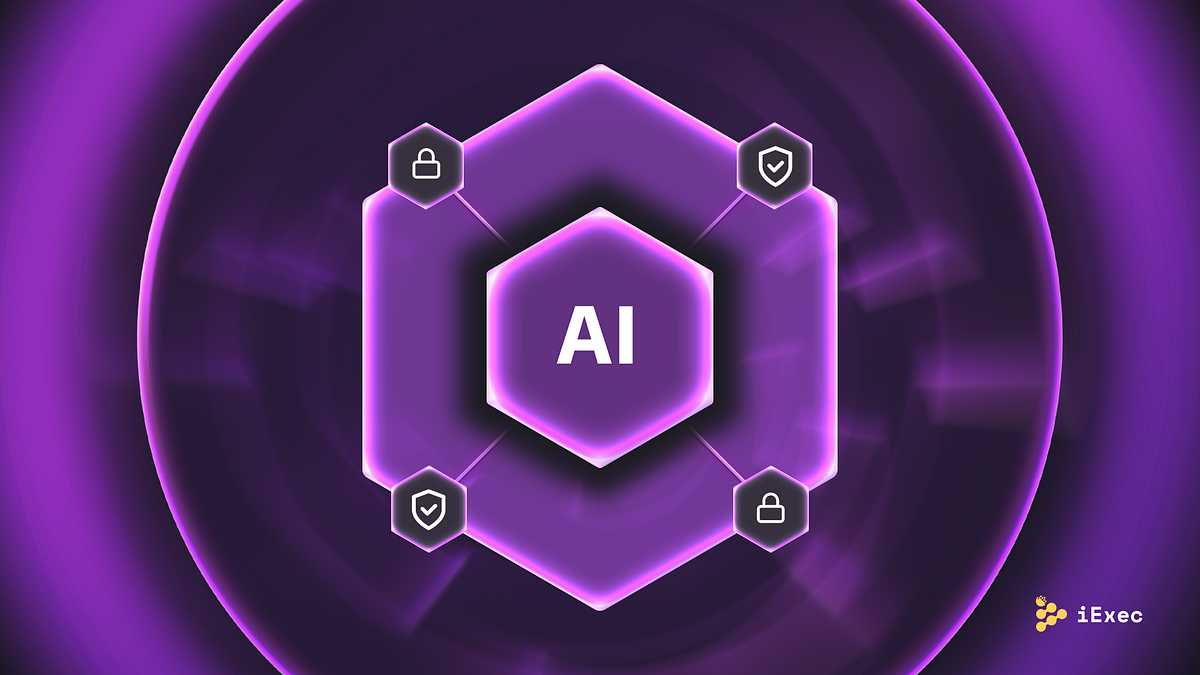Latest iExec News

2 months ago
Revolutionizing Confidential AI with Intel TDX and iExec
The landscape of Confidential AI is undergoing a significant transformation, primarily driven by the introduction of Intel® Trust Domain Extensions (Intel® TDX). For years, developers faced challenges when trying to secure AI workloads using Intel SGX, which often required extensive modifications to applications and led to compatibility issues. This cumbersome process not only wasted time but also hindered the real-world adoption of Confidential AI solutions. However, with Intel TDX, developers can now run AI workloads in secure virtual machines without needing to rewrite their code, thereby streamlining the development process and enhancing performance.
Intel TDX is designed to create a hardware-isolated trusted execution environment (TEE) that enhances data confidentiality and integrity in virtualized environments. Built into Intel’s 4th Generation Xeon® Scalable processors, TDX introduces Trust Domains that isolate virtual machines from the hypervisor and even cloud service providers. This isolation is crucial for AI applications that handle sensitive datasets and proprietary models, as it significantly reduces the attack surface while maintaining high performance. Additionally, TDX is optimized for AI workloads, leveraging advanced CPU capabilities to accelerate deep learning and machine learning models, making it a robust choice for developers.
The collaboration between Intel TDX and iExec is paving the way for a new era of Confidential AI. As a Gold Member of the Intel Partner Alliance, iExec is at the forefront of this movement, providing solutions that enable secure, decentralized, and scalable execution of AI workloads. This partnership not only enhances the security of AI computations but also ensures compliance with data protection regulations. With practical applications in sectors like healthcare and finance, iExec empowers developers to build privacy-preserving AI applications that prioritize data ownership and secure computing, ultimately leading to a more trustworthy AI ecosystem.

2 months ago
iExec's Decentralized Confidential Computing: A Solution for Web3 Privacy Challenges
The Web3 revolution has brought forth promises of enhanced ownership, transparency, and security for users. However, a significant challenge remains: the issue of data privacy and security. Blockchain technology, while offering pseudonymity, records every transaction on a public ledger, which means that true privacy is elusive. Through extensive on-chain analysis, individuals can be traced, exposing them to potential tracking and security threats. To genuinely realize the vision of Web3, developers must prioritize the integration of privacy-centric solutions that safeguard user data while upholding transparency and security.
One of the critical vulnerabilities in Web3 is the handling of data in use. Traditional security measures often focus on data at rest or in transit, neglecting the sensitive data actively processed by applications. Without proper protection, this data remains unencrypted in memory, making it susceptible to breaches and unauthorized access. iExec is addressing this issue with its innovative Decentralized Confidential Computing (DeCC) approach, which combines the decentralization of blockchain with hardware-based security to protect data in use, thus enabling users to maintain ownership and monetize their information securely.
iExec's protocol integrates off-chain confidential computing with on-chain blockchain security through its Proof of Contribution (POCO) smart contracts. This synergy allows developers to create trust-driven decentralized applications (dApps) that manage sensitive data without exposing it to third parties. Tools such as DataProtector and Web3Mail empower developers to encrypt data, manage access dynamically, and monetize digital assets while ensuring privacy. As AI development continues to face challenges regarding data privacy and fair compensation for contributors, iExec's Confidential AI solutions promise secure and scalable workflows, ensuring that data contributors retain control and value in the evolving landscape of Web3.

3 months ago
iExec Launches Hello World Tutorial for Building Privacy-First dApps
Building decentralized applications (dApps) can often feel overwhelming, but iExec's Hello World tutorial simplifies the process for developers at all levels. This hands-on guide focuses on creating privacy-first blockchain applications, emphasizing the importance of data protection, management, and sharing. By utilizing tools like the DataProtector SDK and iExec Apps (iApps), developers can learn to build applications that prioritize user control and data security in just 30 minutes.
The iExec platform is designed for developers who want to ensure privacy and security in their dApps. With features like the DataProtector SDK, developers can encrypt sensitive data throughout its lifecycle, while iExec Apps utilize Trusted Execution Environments (TEEs) to process data securely. This combination of blockchain technology and Confidential Computing allows for secure handling of sensitive information, making it ideal for applications in sectors such as healthcare and finance. Additionally, iExec provides monetization opportunities, enabling developers to tokenize and monetize their data while maintaining security for both builders and end-users.
iExec Hello World serves as a stepping stone for developers looking to create impactful decentralized applications. After completing the tutorial, participants can claim a BUILD voucher to access advanced tools and resources, join the iExec developer community for collaboration, and explore real-world use cases. The structured approach provided by iExec ensures that building privacy-first dApps is not only achievable but also rewarding, empowering developers to protect sensitive data and create innovative solutions in the blockchain space.

4 months ago
iExec Partners with CV Labs to Drive Innovation in Privacy-First Web3 Applications
On January 2nd, 2025, iExec, a pioneering platform in the Web3 space, announced strategic collaborations with prominent venture capital firms and foundations, including CV Labs. As a leader in Decentralized Confidential Computing (DeCC) and an innovator in Decentralized Physical Infrastructure Networks (DePIN), iExec provides essential tools for developing privacy-first applications. These applications empower users to maintain full control over their data and assets. The iExec Grants Program, which supports platform building with tailored assistance, exemplifies their commitment to fostering innovation in privacy-preserving technologies. This was highlighted during the Grants Pitch Day at Devcon 2024, where 16 finalists competed for grants totaling up to $500,000, showcasing the collaborative spirit that propels the Web3 ecosystem forward.
One of the standout projects from the event was Bridge23, a platform that incentivizes users for their data usage while training AI agents. Utilizing the iExec DataProtector tool, it ensures user privacy is safeguarded, allowing for secure monetization. This initiative underscores iExec's role in driving innovation in confidential AI, placing privacy and data ownership at the forefront of advancements in the field. The partnership with CV Labs further strengthens iExec's ecosystem, providing projects in CV Labs' incubation programs access to iExec's developer resources, thereby fostering innovation across various sectors, including DeFi and data management.
The collaboration between iExec and CV Labs not only enhances the exposure of participating projects but also connects them with potential investors, facilitating seed funding opportunities. This partnership aims to bridge cutting-edge technology with mentorship and funding, creating an environment where privacy-first Web3 applications can thrive. Nathan Chiron, Chief of Revenue & Ecosystem at iExec, emphasized that these strategic collaborations are pivotal in accelerating the innovation of confidential computing solutions, setting new standards for the AI and Web3 industries. Through these initiatives, iExec solidifies its position as a key enabler of privacy-first applications, empowering developers to build, own, and monetize digital assets confidently.

5 months ago
Empowering Data Ownership in Web3 with iExec
In the evolving landscape of Web3, data ownership has emerged as a critical concern for developers and users alike. As decentralized applications (dApps) gain traction, questions surrounding who can access user data, how it is utilized, and whether users can reclaim control after sharing become paramount. The promise of Web3 is to empower users with control over their personal information, necessitating a shift in how developers approach data security and governance. iExec offers a suite of solutions designed to address these challenges, ensuring that users retain full control over their data even after it has been shared.
Developers face several key challenges regarding data ownership, including security, control, and trust. Users often hesitate to engage with dApps due to concerns about unauthorized access to their data. iExec's tools, such as DataProtector, provide robust encryption for both data storage and sharing, allowing users to encrypt files before sharing them on decentralized platforms. Additionally, iExec's on-chain data tokenization system enables users to transform their information into digital assets, granting them the ability to grant or revoke access as needed. This ensures that users can share sensitive information, like medical records, while maintaining control over who can access it and for how long.
Moreover, iExec's privacy-enhancing tools, such as Privacy Pass, empower Web3 users to monetize their personal data without sacrificing ownership or privacy. By allowing users to participate in targeted marketing campaigns while keeping their personal information confidential, iExec facilitates a secure environment for data monetization. The combination of blockchain technology and Trusted Execution Environments (TEEs) ensures that sensitive data remains protected during processing, allowing third-party applications to interact with encrypted datasets without ever accessing raw information. As developers navigate the complexities of data ownership in Web3, iExec provides the necessary tools to build trust and empower users in the decentralized ecosystem.

5 months ago
Empowering Content Creators with iExec's DataProtector Tool
In the evolving landscape of content creation, creators often grapple with significant challenges such as ownership issues, unfair monetization models, and censorship. iExec aims to address these concerns by empowering developers with the 'DataProtector Monetize Version' development tool. This innovative tool enables developers to create applications that help content creators regain control over their work, monetize it fairly, and protect their creative freedom. The Content Creator Demo App serves as a prime example, providing a template for developers to build solutions that tackle the pressing issues faced by content creators today.
One of the most pressing challenges for content creators is the lack of ownership over their creations. In the traditional Web2 environment, platforms often retain control over the content, which can lead to arbitrary removals and restrictions. iExec's DataProtector module allows developers to create decentralized applications (dApps) that ensure creators maintain true ownership of their work. By encrypting content and recording ownership on the blockchain, creators can secure their digital assets, grant or revoke access as needed, and protect their work from unauthorized alterations. This shift not only empowers creators but also ensures they can monetize their content without the fear of losing control.
Moreover, the monetization landscape for content creators is often skewed in favor of platforms, leaving creators with minimal earnings despite their hard work. iExec's DataProtector tool facilitates the development of applications that enable creators to rent, sell, or offer subscriptions for their content, utilizing blockchain technology to ensure fair compensation through smart contracts. The Content Creator Demo App exemplifies how developers can build solutions that bypass traditional platform constraints, allowing creators to express themselves freely and monetize their work directly. As developers harness the capabilities of the DataProtector tool, they can significantly contribute to a more equitable and decentralized creator economy.

6 months ago
iExec and Lobster Revolutionize Web3 Communication with Privacy-First Innovation
The recent partnership between iExec and Lobster marks a significant advancement in Web3 communication, particularly in the realm of privacy. With the integration of iExec's Web3Mail, Lobster can now send encrypted emails to users without ever needing to store or even access their email addresses. This innovation utilizes confidential computing and blockchain technology to ensure secure communications while granting users complete control over their privacy. By leveraging Intel SGX hardware encryption, the collaboration has created a tamper-proof communication method that effectively protects users from data breaches and unsolicited spam.
This partnership not only enhances user privacy but also opens up new avenues for developers interested in creating privacy-first applications. iExec is actively encouraging builders to participate in their grants program, which aims to support innovative projects that align with their ecosystem. Interested developers can submit proposals detailing their project's technical aspects, purpose, and long-term benefits. Selected applicants will undergo a technical interview, and grants will be awarded based on the achievement of specific milestones, fostering a collaborative environment for innovation.
Looking ahead, the potential of this partnership is vast, and both iExec and Lobster are excited about the future of privacy-first technology. Users are invited to experience this new level of privacy by subscribing to Lobster's secure newsletter. Additionally, developers are encouraged to explore the opportunities available through iExec's grants program, as this collaboration is just the beginning of what can be achieved in the realm of secure communications and privacy-focused applications.

7 months ago
iExec: Pioneering Decentralized Confidential Computing in Web3
As Decentralized Confidential Computing (DeCC) gains traction in 2024, iExec has been a pioneer in this domain, merging Confidential Computing with blockchain since 2018. Collaborating with Intel, iExec launched the first Trusted Compute Specification for the Ethereum Enterprise Alliance, laying the groundwork for secure data processing in Web3. By 2019, iExec became the first Web3 company to join the Confidential Computing Consortium, solidifying its role in decentralized data protection. These early innovations have paved the way for DeCC, which redefines data privacy and security in the Web3 landscape.
Confidential Computing is a critical component of DeCC, addressing the need to protect data not only at rest and in transit but also during processing. This technology isolates sensitive data or code using hardware enclaves, creating a trusted execution environment that processes encrypted data in memory. By employing hardware-based attestation reports, Confidential Computing ensures that only authorized programs can access the data within these enclaves. This approach safeguards various types of data, from personal information to complex algorithms, enhancing security in an increasingly fragmented data landscape.
The DeCC movement promotes a broader understanding of privacy in Web3, emphasizing user control and decentralized security. With the formation of the DeCC Alliance, which includes leading projects in Confidential Computing, the initiative aims to educate the public on the capabilities of DeCC and its necessity for secure data usage. iExec's mission is to empower users by tokenizing their data and establishing governance rules, ensuring that data remains secure and private. As DeCC continues to evolve, it is set to transform the Web3 ecosystem, making privacy and data ownership a fundamental right for users in the digital age.

7 months ago
The Rise of Confidential AI: Ensuring Trust and Security in AI Applications
Artificial Intelligence (AI) has evolved into a crucial asset for organizations, with three-quarters now leveraging it to enhance innovation, efficiency, and growth. Analysts predict that by 2026, 80% of enterprises will utilize AI-enabled applications, significantly transforming various industries. The marketing and advertising sectors are at the forefront, using AI to secure a competitive edge. However, as AI becomes more prevalent, concerns regarding data confidentiality arise, particularly regarding the use of sensitive business and personal information in training AI systems. Ensuring confidentiality is vital not only for security but also for building trust and fairness in AI-driven decisions.
The challenges of AI, often referred to as the "black box problem," highlight the need for transparency in AI systems. Users frequently struggle to understand how AI makes decisions, raising concerns about accountability and ethical standards. Privacy issues are compounded by the handling of personal data, and data sovereignty becomes a critical consideration, especially with cross-border data flows. As AI increasingly influences our lives, companies face the dual challenge of ensuring security while also finding ways to monetize AI applications without compromising user privacy. Confidential AI emerges as a solution to these challenges, emphasizing secure data handling and decision-making processes.
At iExec, the focus on confidential computing ensures that sensitive data remains protected throughout the AI workflow. By utilizing blockchain technology, iExec enhances the verifiability and trustworthiness of AI processes, allowing stakeholders to track each step and verify results. This integration of Confidential AI with blockchain not only safeguards data but also provides a framework for monetizing AI applications while maintaining user privacy. As advancements continue in this field, the future of Confidential AI looks promising, with ongoing developments aimed at enhancing security, transparency, and ethical considerations in AI applications.
Signup for latest DePIN news and updates